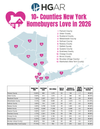RYE BROOK—The Westchester County commercial market ended the first half of 2023 with mixed results showing continued strength in multifamily developments and solid performance in the industrial/flex market. Meanwhile, demand for retail space weakened modestly and office buildings struggled with lower occupancies due to the work from home environment, according to the recently released Houlihan Lawrence Q2 Commercial Market Report.
“Despite some pockets of weakness, commercial real estate space demand in Westchester has been resilient. The greatest immediate risk to commercial real estate is the lack of available financing liquidity to investors. Recent bank failures have placed a spotlight on regional lenders and regulators will be on high alert when scheduled reviews take place,” said Garry Klein, Managing Director of Houlihan Lawrence Commercial Division.
“In summary, the service segment of the economy is currently the strongest engine of economic growth, at a local and national level. Importantly, services industries, key to Westchester County’s economic health, employment, and commercial real estate occupancy, have solid prospects, over the near and medium term, due to favorable demographics that have become stronger in the post Pandemic period,” Klein added.
Residential Apartments Maintain Their Shine
After reaching a vacancy high of 4.6% in the third quarter of 2022, brisk demand resulted in an improvement in Westchester multifamily occupancy during the subsequent quarters and now stands at 3.8%. During the quarter, 612 units, equivalent to 1% of the area inventory of apartment units, were delivered and absorbed. At the same time, concessions have declined, and effective rents have increased. The remarkable strength of the multifamily segment of the market persists, the report noted,
Rebounding apartment rents in Manhattan, the appeal of strong educational and medical systems, proximity to parks and other open- air recreation, in addition to attractive pricing as compared to New York City, have continued to support demand for apartments in lower Westchester County. In addition, difficult single-family affordability is keeping households renting for longer than expected.
Several local municipalities and cities, such as New Rochelle, Yonkers, White Plains and Port Chester, have enacted zoning initiatives that encourage apartment construction in proximity to transportations hubs and the pipeline of new projects is meaningful at over 10% of existing stock.
Retail Space Demand Weakens Modestly
During the quarter, demand and pricing for retail space weakened, albeit marginally. Leasing activity declined and fewer deals were completed. There was no activity in sublet retail space and overall occupancy declined as retailers gave back space. Despite sluggish fundamentals, rents have remained relatively stable, with overall inflation helping Landlord pricing power. New deliveries, primarily on the ground floor in new residential projects, have had difficulty leasing in an environment where fears of an impending decline in economic activity are widespread and prospective tenants are price sensitive.
Retail shops and retailers remain under transformative pressure, in response to consumer demand and preference changes that have taken place post-pandemic. Personal services and fast-food hospitality industries have emerged as the driving force of retail demand, especially in areas of above average disposable income, such as Southern Westchester. Several big box retailers have failed, are being acquired or are currently under stress. Examples are Bed, Bath and Beyond and the Christmas Tree Shops. Town centers have seen a resurgence of ethnic or health food franchises or chains. Medical services are migrating to select retail areas where parking is available. Physical fitness concepts are looking for well-located retail in side streets. Beauty concepts are searching for convenient and affordable retail space, willing to sacrifice visibility. These trends are gradually changing the shape of in-town retail areas as well as shopping centers across Westchester County according to the report.
Office Occupancy Weakens Further
Over the last four quarters the Westchester commercial office market experienced unfavorable supply-demand dynamics. Reported vacancies are now 11.1% but availability (offered for lease but not empty) stands at over 12%. Pricing has remained resilient driven by inflation and mix, as higher end (and pricier A properties) are leading lease transactions. It is remarkable that leasing activity has rebounded, however, departures have overwhelmed new leases.
Office buildings continue to experience low occupancy and multiple departures, as the dynamics of the work-from-home protocols evolve in an environment where employees have voiced a strong preference for flexibility in their work locations. Corporations of all sizes continue to struggle to lure employees back to the office and have settled for offering varying degrees of work-from-home flexibility. Concurrently, corporations are re-examining their office needs and returning space to landlords when leases come due. This friction remains central to office fundamentals and will shape office fundamentals over the near term.
Industrial Assets Remains Resilient
Despite some marginal loss in occupancy, industrial assets have fared well for an extended period of time. In the most recent quarter, supply of space exceeded demand and occupancy weakened modestly. Leasing activity was brisk, and pricing remained resilient. The fundamentals for industrial use/occupancy are intact. Demand closely tracks consumer spending trends in Westchester County. Companies value resilience in supply and delivery networks located near to the consumer. Westchester industrial, which is typically located in proximity to high consumption areas, has become even more valuable.
Investment Transactions Decline
Commercial real estate value uncertainty, tight financing markets, cautious lender underwriting and an inverted yield curve- signaling an economic slowdown- are all creating hurdles for investors. Both the number of transactions and median price per-square-foot declined during the quarter. Slowly, the market is beginning to see new offerings for sale, now concentrated in office properties. Houlihan Lawrence Commercial expects investor opportunities to emerge in earnest toward the end of 2023 or when inflation trends stabilize, and investors can more confidently assess costs of improvement and future cash flows for investment properties that become available.









